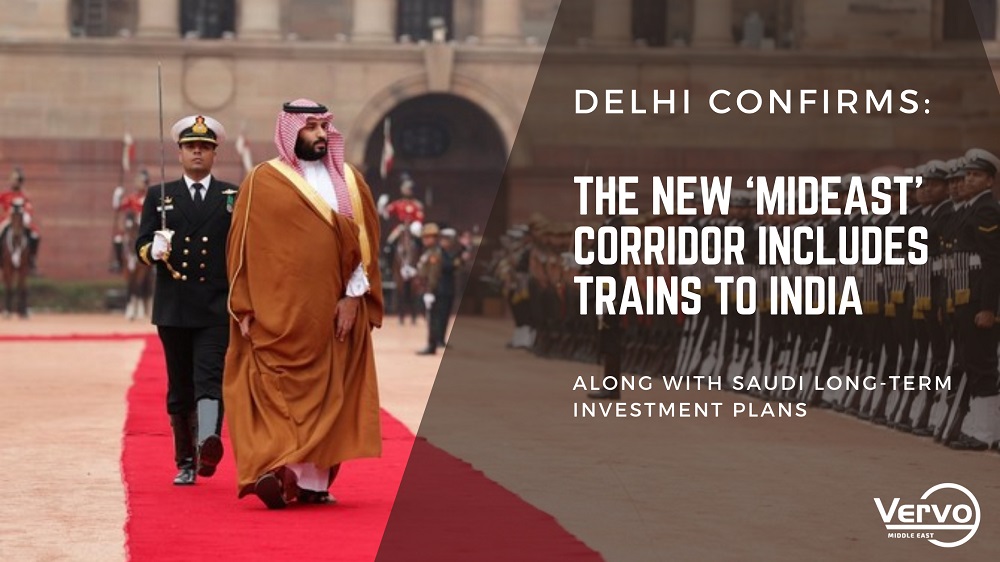Delhi confirms the new ‘Mideast’ corridor would include trains to India along with Saudi long-term investment plans between the two countries.
The latest G20 Summit held in Delhi this past weekend has become a launchpad for a transformative infrastructure plan that is poised to restructure the connectivity landscape of the Middle East and South Asia.
Indian Foreign Ministry Secretary, Ausaf Sayeed, revealed on Monday at a media briefing that the projected ports and railway corridor spanning the Middle East and South Asia will indeed include train links to India. The latest update on the Middle East-South Asia Corridor (MESC) further clarifies the project's breadth and scope.
‘It's not just about India building the railroads’ — Ausaf Sayeed
India will be connected via new railway links as part of the corridor, essentially serving as the heart of this new trade route. These railway links will connect Indian ports to Gulf ports, exponentially expanding trade potential and making India a key player in global commerce. “It's not just about India building the railroads," Ausaf Sayeed clarified. This illuminates the broader objective of the initiative to be not just a logistical game-changer but also a catalyst for interconnectedness among nations.
A Countermeasure to China's Belt and Road Initiative
This global infrastructure venture is also garnering attention as a strategic response to China's Belt and Road Initiative. While China's mammoth project has been expanding its reach, this new corridor, endorsed by a robust consortium of international partners, seeks to provide a balanced alternative. In essence, it aims to create a network that promotes multi-lateral partnerships as opposed to singular dominance.
While the project has multiple facets, it's hard to ignore its strategic positioning as a response to China's Belt and Road Initiative. The MESC aims to provide an alternative, offering countries in the Middle East and South Asia a different path to economic prosperity and geopolitical stability.
‘The New Silk and Spice Route’ — Saudi Investment Minister
Drawing on historical parallels, Saudi Investment Minister Khalid Al Falih likened the proposed corridor to "the equivalent of the Silk Route and Spice Road." He envisioned it as a conduit for "greater energy connectivity, green materials, and processed and finished goods" that could very well "rebalance global trade." This statement comes with the global view of the MESC project as a countermeasure to China's ‘Belt and Road’ initiative.
While the project has multiple facets, it's hard to ignore its strategic positioning as a response to China's Belt and Road Initiative. That is why it garners global attention. The MESC aims to provide a balanced alternative, offering countries in the Middle East and South Asia a different path to economic prosperity and geopolitical stability. In essence, it aims to create a network that promotes multi-lateral partnerships as opposed to singular dominance.
Comprehensive Energy Partnership
In an already eventful state visit, Saudi Crown Prince Mohammed bin Salman and Indian officials established a comprehensive energy partnership in light of this announcement. A series of eight agreements were signed. This is not just about oil; it includes green energy, technology transfer, and shared innovation. Discussions even opened up on trading in local currencies and expediting free trade agreement talks between India and the Gulf Cooperation Council, where Saudi Arabia is a key member.
Saudi Investment and Future Developments
On the financial front, a joint task force is set to oversee a colossal $100 billion in Saudi investment in India. Remarkably, half of this funding is allocated for a deferred refinery project along India's western coastline. Besides ports and railroads, the corridor will also feature upgraded roads, power grids, gas networks, and an optical fiber network.
In light of this announcement, what do you think are the implications for the logistics sector in the Middle East? Why should local traders care? And given the logistical consequences of a zero COVID policy in China, do you think India is really replacing China?
Sources:
"New Mideast corridor would include trains to India, Delhi says." — Reuters
"Goal is to establish new shipping corridors across regions - NEW IMEC" — Daily Mail
"The Consequences of An India-Middle East-Europe Economic Corridor" — The Hill

